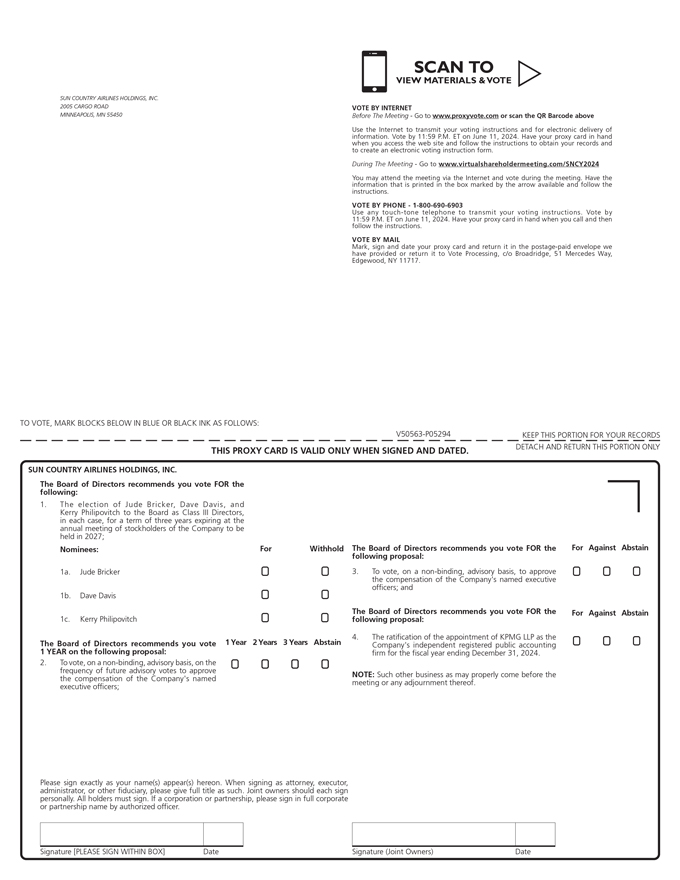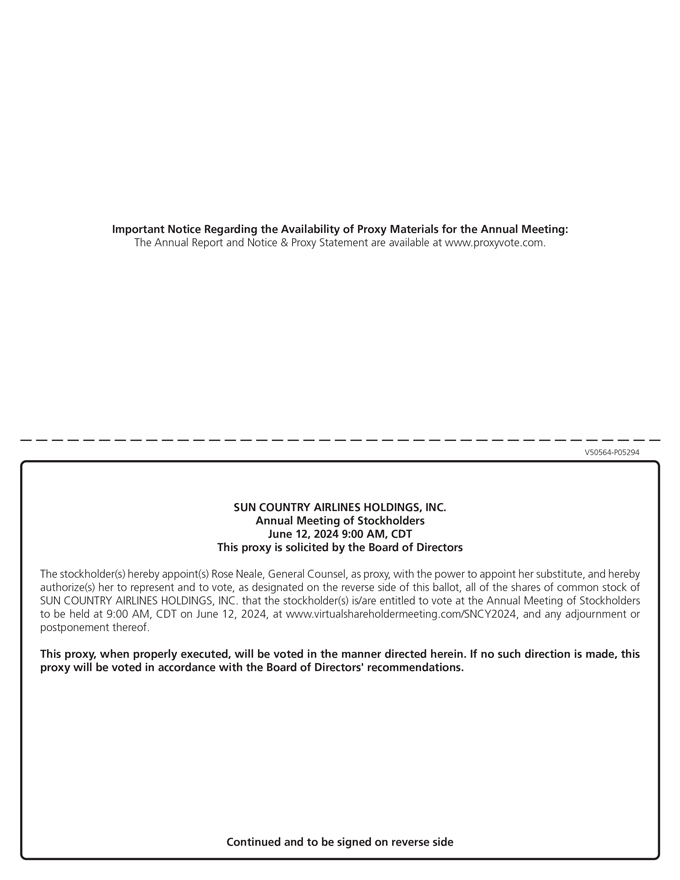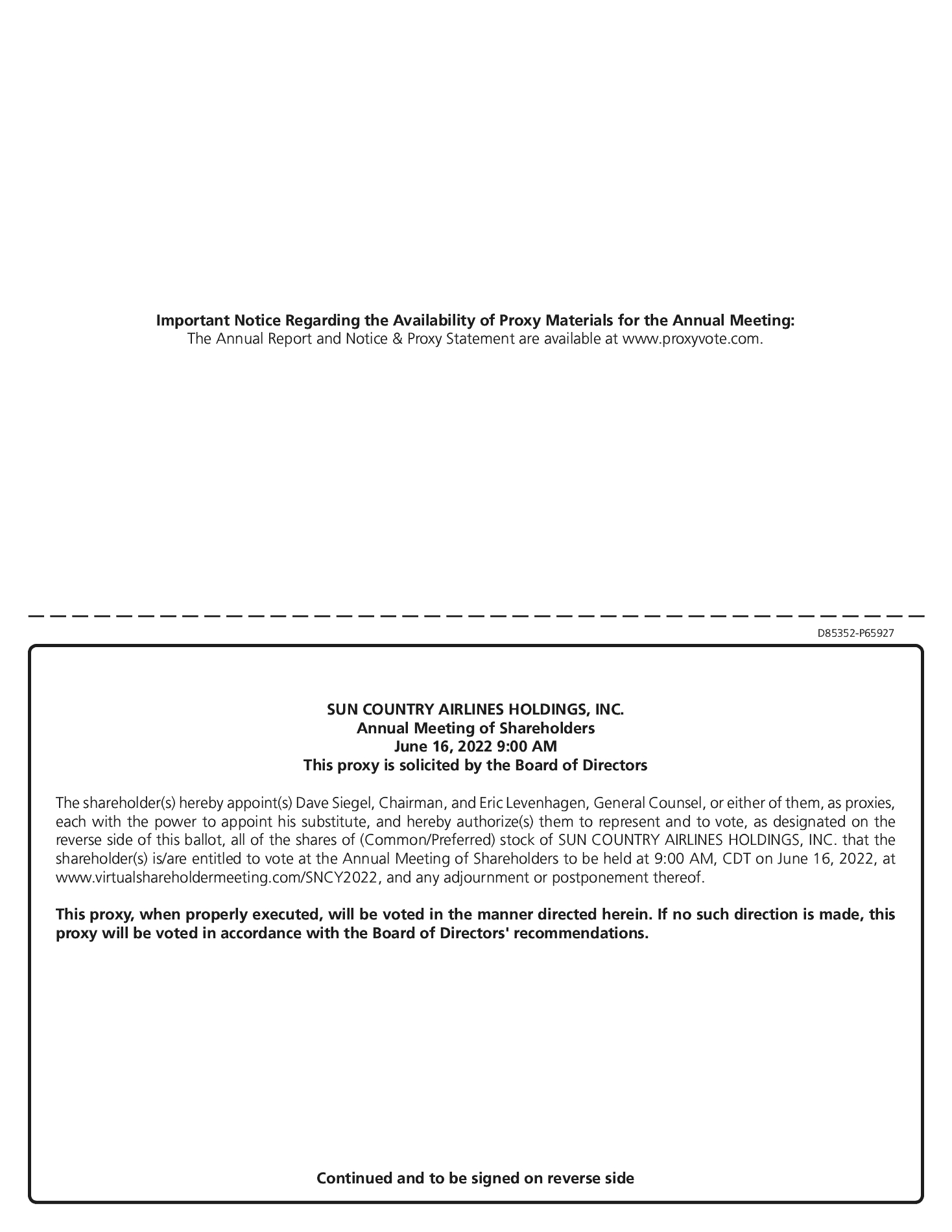Ms. Blakey’s board experience is vast, and includes recent roles serving on the board of Alaska Airlines Group, Aerojet Rocketdyne, and NASA’s National Advisory Council. Ms. Blakey graduated from Mary Washington College of the University of Virginia before continuing graduate work at Johns Hopkins University, School of Advanced International Studies.
David Siegel Ms. Blakey is a valuable member of the Board of Directors because of her experience in the airline industry, including her leadership positions in both the private and public sectors (including with our primary regulator), and her past experience as a director of other public companies, as well as her deep expertise in safety oversight and administration.Patrick O’Keeffe has been a member of our boardBoard of directorsDirectors since April 2018, serving as our Executive Chairman from April 2018 to March 2021, and as our Chairman since March 2021. Prior to joining Sun Country,2022. Mr. Siegel served as the Chief Executive Officer of Ansett Worldwide Aviation Services, one of the world’s 10 largest aircraft leasing companies, from April 2016 to September 2017. From January 2012 to May 2015, Mr. Siegel served as the Chief Executive Officer and President of Frontier Airlines, Inc. Prior thereto, Mr. Siegel served as Chairman and Chief Executive Officer of XOJET, Inc., and as President, Chief Executive Officer and board member of US Airways Group, Inc. Mr. Siegel currently serves on the board of directors and as Chairman of Volotea, S.A. Mr. Siegel earned a MBA with honors from Harvard Business School and graduated magna cum laude from Brown University with an Sc.B. in Applied Mathematics—Economics.
Patrick O'KeeffeO’Keeffe brings more than 30 years of experience in the airline industry where he worked at American Airlines Group, Inc. O'Keeffeuntil his retirement in 2020. O’Keeffe is the former senior human resources officerSenior Vice President, People for American Airlines. FromAirlines, where from 2017 to 2020, he led American'sAmerican’s global People team, managing talent acquisition and development, compensation, health and wellness, pension and 401(k) management, team member engagement as well as diversity, equity and inclusion. Prior to that, he held multiple leadership positions in IT at American.American Airlines. He serves on the boards of Lambda Legal and the National Gay and Lesbian Chamber of Commerce.is currently an advisory board member for ID90 Travel. He earned an MBA from Rice University in Houston and a BBS in accounting and finance from the University of Limerick in Ireland.
Class III Directors
The term Mr. O’Keeffe is a valuable member of the following three Class III directors will expireBoard of Directors because of his experience as an executive at the 2024 annual meeting of stockholders.
Jude Bricker has served as our Chief Executive Officer since July 2017a large public company and as a member of our board of directors since April 2018. Mr. Bricker has 17 years of experiencehis expertise in the aviation industry. He previously served as the Chief Operating Officer of Allegiant Travel Company from January 2016 to June 2017,airline industry, as well as various other leadership roles from 2006 to 2016. As Chief Operating Officer of Allegiant Travel Company, Mr. Bricker was the senior executive responsiblehis significant experience in and expertise with talent management and information technology for marketing, network, operations, treasury, fleet, scheduling, pricing, ancillary products, digital, distribution, charters, loyalty and investor relations. From July 2004 to May 2006, Mr. Bricker was a finance manager at American Airlines. Mr. Bricker holds a BScompanies in Civil Engineering from Texas A&M University and an MBA from the University of Texas.
Dave Davis has served as our Chief Financial Officer and a member of our board of directors since April 2018 and as our President since December 2019. Prior thereto, from December 2017 to April 2018, Mr. Davis was an advisor to Sun Country. From July 2014 to February 2017, Mr. Davis served as Chief Executive Officer and a member of the board of directors, and from November 2012 to June 2014, served as Chief Financial Officer and Chief Operating Officer, of Global Eagle Entertainment, Inc., a leading global provider of media content and satellite-based connectivity systems for use in commercial aviation, maritime and remote land-based applications. Prior thereto, Mr. Davis was the Executive Vice President and Chief Financial Officer of Northwest Airlines, Inc., the world’s fourth largest airline prior to its sale to Delta Air Lines in 2008. Additionally, Mr. Davis has held various finance leadership positions at US Airways, Perseus LLC and Budget Group, as well as served on the boards of directors of Globecomm Systems, Inc., Lumexis Corporation and ARINC Corporation. Mr. Davis received a Bachelor of Aerospace Engineering and Mechanics degree and an MBA from the University of Minnesota.
Kerry Philipovitch has been a member of our board of directors since December 2020. Ms. Philipovitch also serves on the boards of Avianca Airlines, hospitality wine management company Intervine, and technology start-up OptIn. She served in aviation management roles for 23 years, most recently as Senior Vice President—Customer Experience for American Airlines. She oversaw airline operations impacting critical measures of customer value, including worldwide airport customer service, ramp, and baggage operations; onboard flight service and catering; global call centers; cargo; customer planning; and service recovery. In addition to her operating responsibilities, Ms. Philipovitch worked with the NAACP and other important community partners to develop an inclusion and diversity strategy for the airline, and frequently served as a subject matter expert in educating government officials on important industry issues. Ms. Philipovitch was selected as an honoree for the Dallas Business Journal’s 2019 Women in Business Awards, an award that recognizes business leaders for impressive professional achievements and proven track record. Profiles inindustry.10



